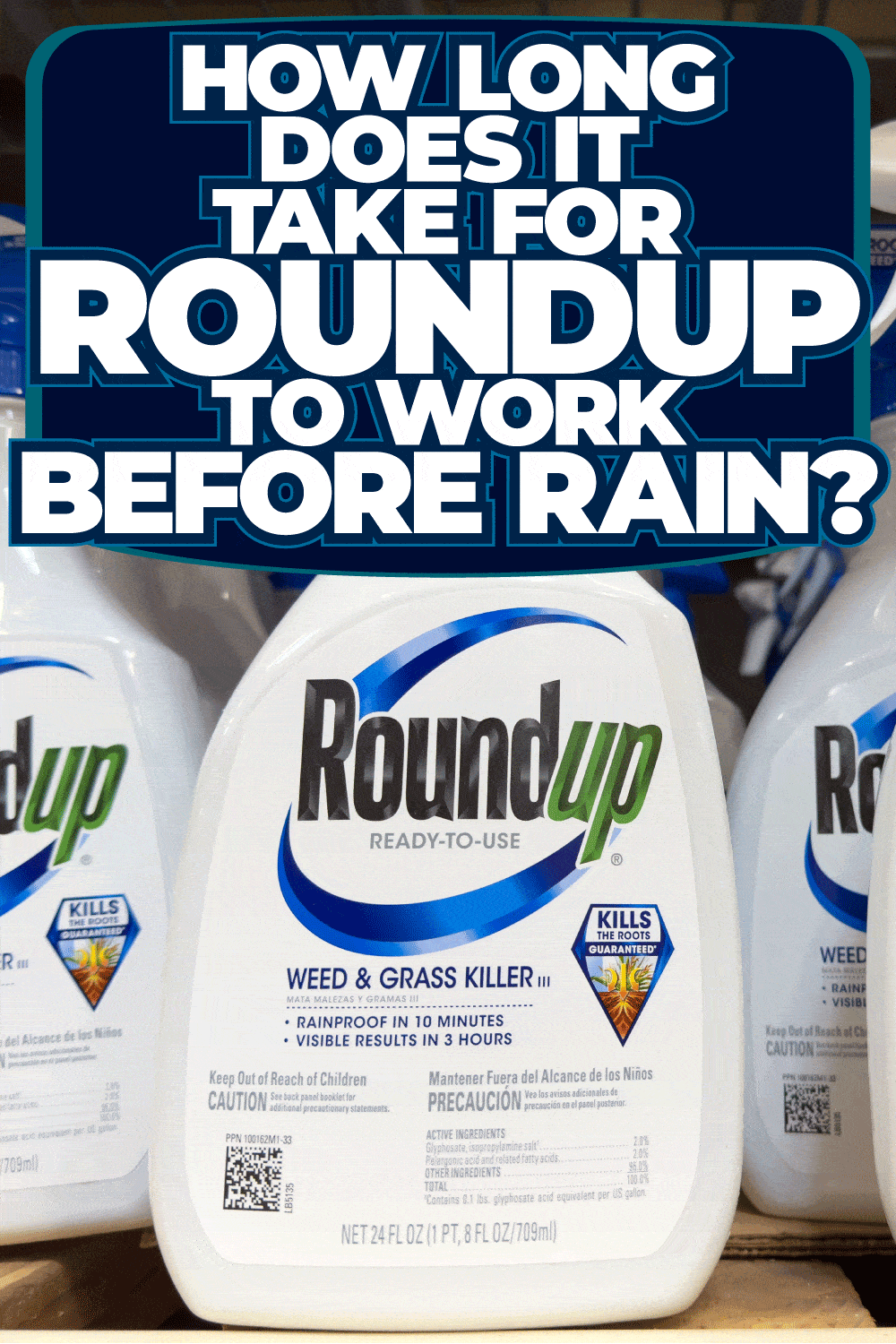Figuring out when and how to use herbicide can sometimes feel impossible. Do you want to spray for weeds, but there's possible rain, and you don't know how long Roundup takes to work? Is it okay to try and spray Roundup before a rainstorm makes its way into your garden?
Well, we've done some digging and have the answers to these questions below!
You can usually expect Roundup to work within 30 minutes to three hours to waterproof on your weeds. Therefore, if a storm is coming and you want to spray beforehand, you might want to double-check your product to see its rainproofing timeline.
According to Roundup, this can vary depending on the formula, so not every herbicide from the brand can become waterproof within 30 minutes.
As we start this article, we will cover all things using Roundup and discuss when to do this before a rainstorm. Whether you have persistent weeds, live somewhere wet, or have additional questions, we're here to help. With that said, let's dive right into this topic and figure things out!
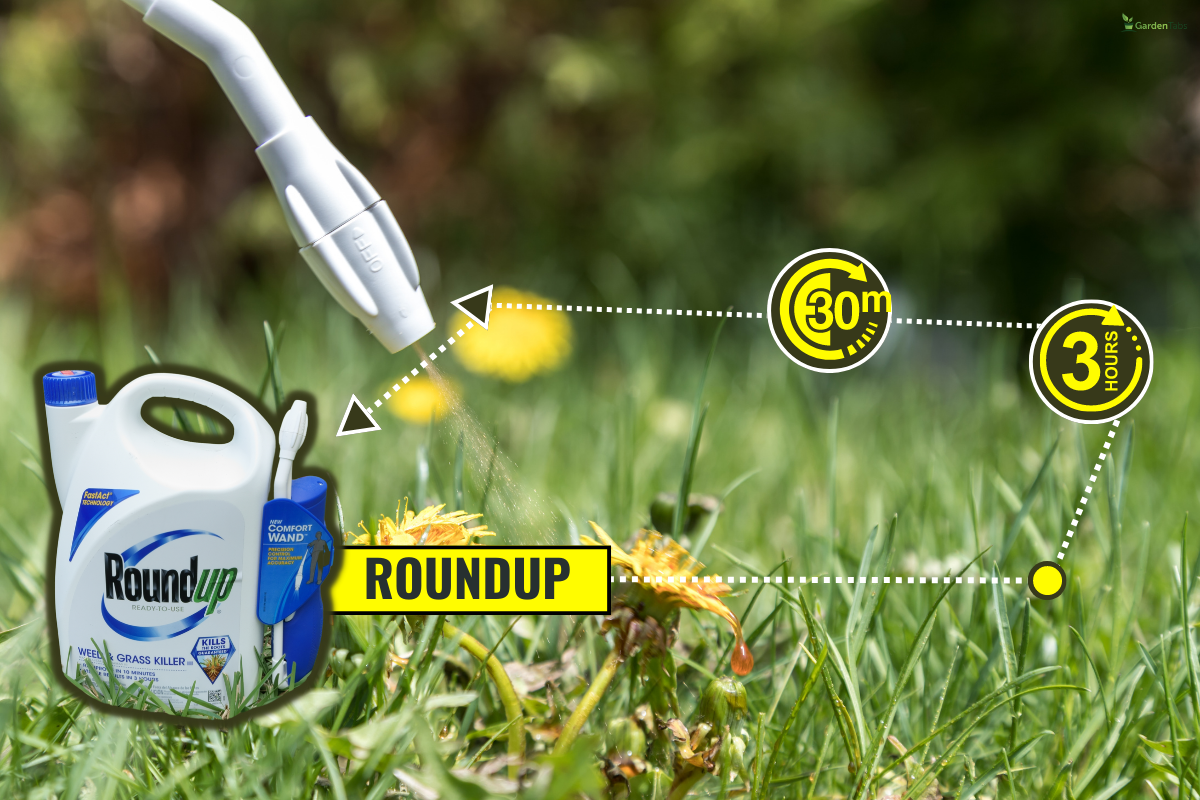
How Long Before Rain Can You Spray Roundup?
In general, the activated waterproofing agent in Roundup will kick in 30 minutes-three hours post application. With that said, some products from this brand waterproof faster than others, so this can be different for everybody.
However, according to the brand's official website, all Roundup products can become rainproof. So, if a storm is on the horizon and you want to spray, you might get away with doing so.
The key to using Roundup is letting it have enough time to seep into your weed's leaves and soil. From there, it will attack the roots and kill your weed from the inside out.
That said, if it rains before your Roundup can activate the water-repelling agent, this is when you might need to reapply once the weather clears.
If possible, we recommend waiting to spray herbicides until the weather is clear and rain-free. Doing that will ensure your product has time to work and can take some stress off your back.
Should I Use Roundup Before It Rains?
If you can avoid using Roundup before it rains, that's usually best. As we said, spraying this herbicide before an expected rainstorm can lead to wasted product and a live and growing weed.
Most times, you want to spray Roundup on a clear, rain and wind-free day, so it can seep into your weed and start killing it. If the rain touches your Roundup before it waterproofs itself, this is when it will wash away and become useless.
Even though the company claims its products will rainproof themselves in 30-180 minutes, that doesn't always mean rain hitting your weeds won't impact their efficiency.
Furthermore, it is better to allow Roundup to sit on a plant for a few hours before it can get to work. So, if heavy rain falls, you could have to apply a second coat to your weeds once things clear up.
Again, this is different for everyone, but if possible: wait to use Roundup until the weather's clear.
What Happens If It Rains After I Spray Roundup?
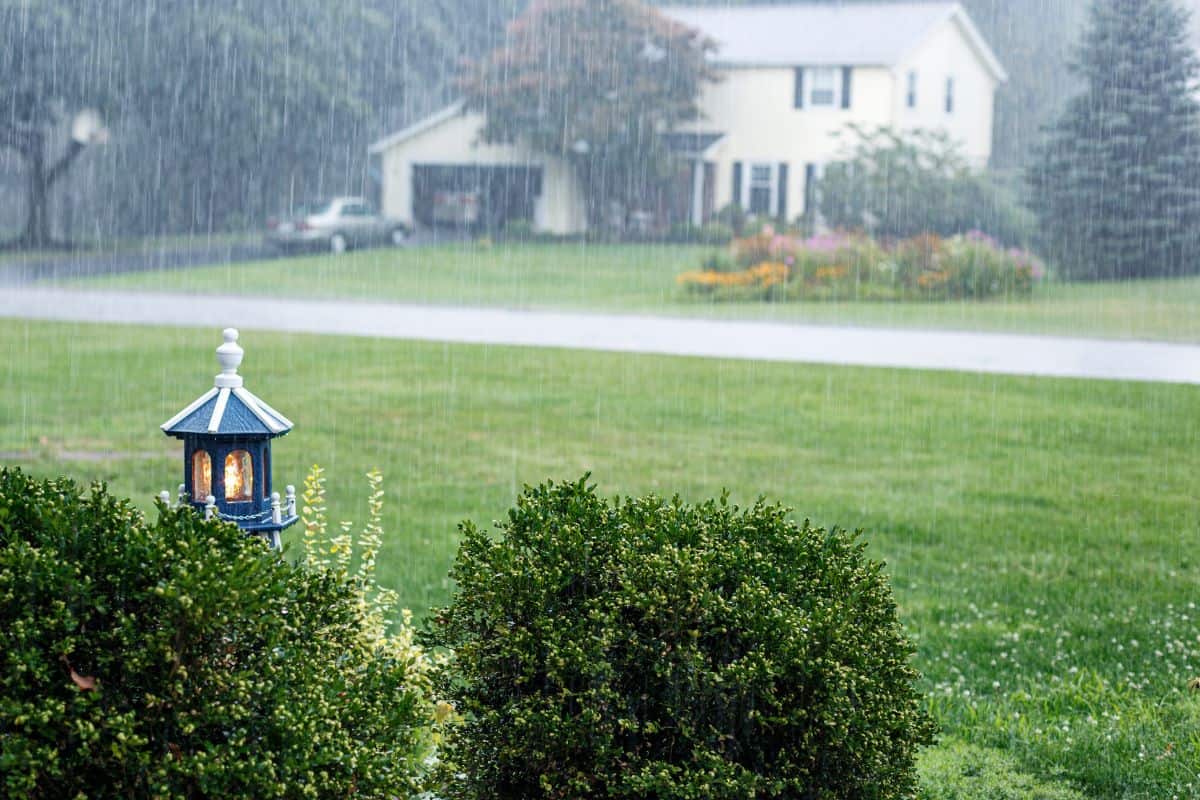
If you spray Roundup and a freak rainstorm comes shortly after, expect a few things to happen. First, the ingredients in Roundup can waterproof themselves, but this takes up to 180 minutes.
So, if the storm hits before that grace period, your Roundup could have trouble absorbing into the leaves and roots of your weed.
According to the University of Nebraska-Lincoln, any amount of rainfall after using an herbicide can result in reduced absorption, translocation, and subsequent weed control.
Therefore, doing this before it rains or your sprinklers turn on can waste your time and product. Rainfall can wash Roundup into other sections of your garden, which can also become a problem for non-weeds.
So, the less moisture in the air or ground, the better.
What Is The Best Weather To Use Roundup In?
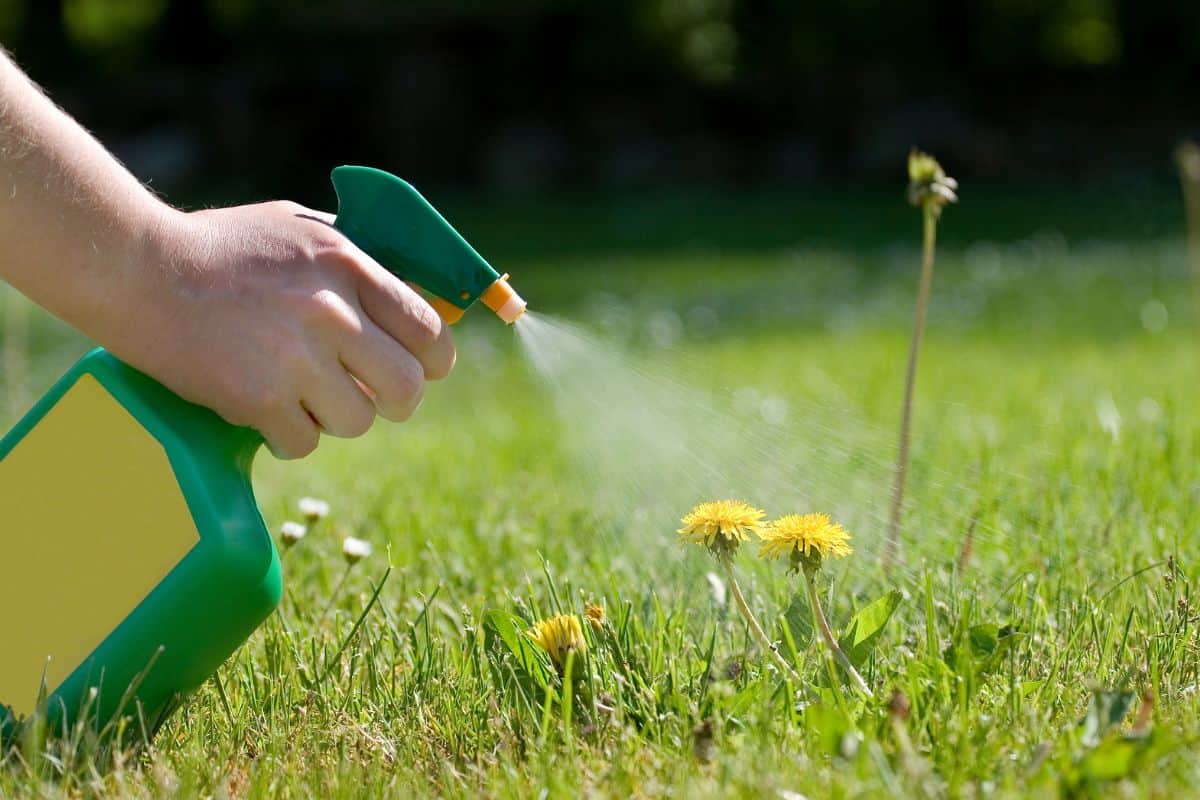
The best weather for Roundup is clear, low wind, and rain-free conditions. As we said earlier, Roundup can rainproof itself fairly quickly, but that doesn't mean rain is good for its efficiency.
Therefore, it is better to wait until a clear, temperate day to use herbicides throughout your yard. Ideally, the sun will be shining, the winds will be low, and there won't be rain for a few days.
The more time you give your product to seep into a weed's leaves and roots, the better they can kill and prevent it from returning. Some of Roundup's faster-working products even show results the same day, so this should be a pretty fast process.
On top of that, more sun and low winds can help speed up your Roundup formula, so that's something to remember when applying it.
For temperature, we recommend waiting until the weather is between 45 and 90 degrees Fahrenheit to spray Roundup on your weeds.
What Time Of Year Should I Wait To Use Roundup In?
The best time of year for spraying Roundup is after winter in the spring and summer. Since most weeds come back with a vengeance in the early spring season, you want to spray them ASAP with an herbicide.
The company suggests applying its Roundup line of products in "calm" conditions, which typically fall within a spring timeline. Since the spring is when the temperatures rise, but not too extreme, that makes it the perfect time to kill weeds.
On top of that, you need to wait to use herbicides until a weed is actively growing. If you try spraying a dormant weed, chances are it will return anyways.
So, to avoid wasting your time and product, try and wait until after winter and use Roundup throughout the spring and early summertime.
Does Roundup Work Better In Hotter Weather?
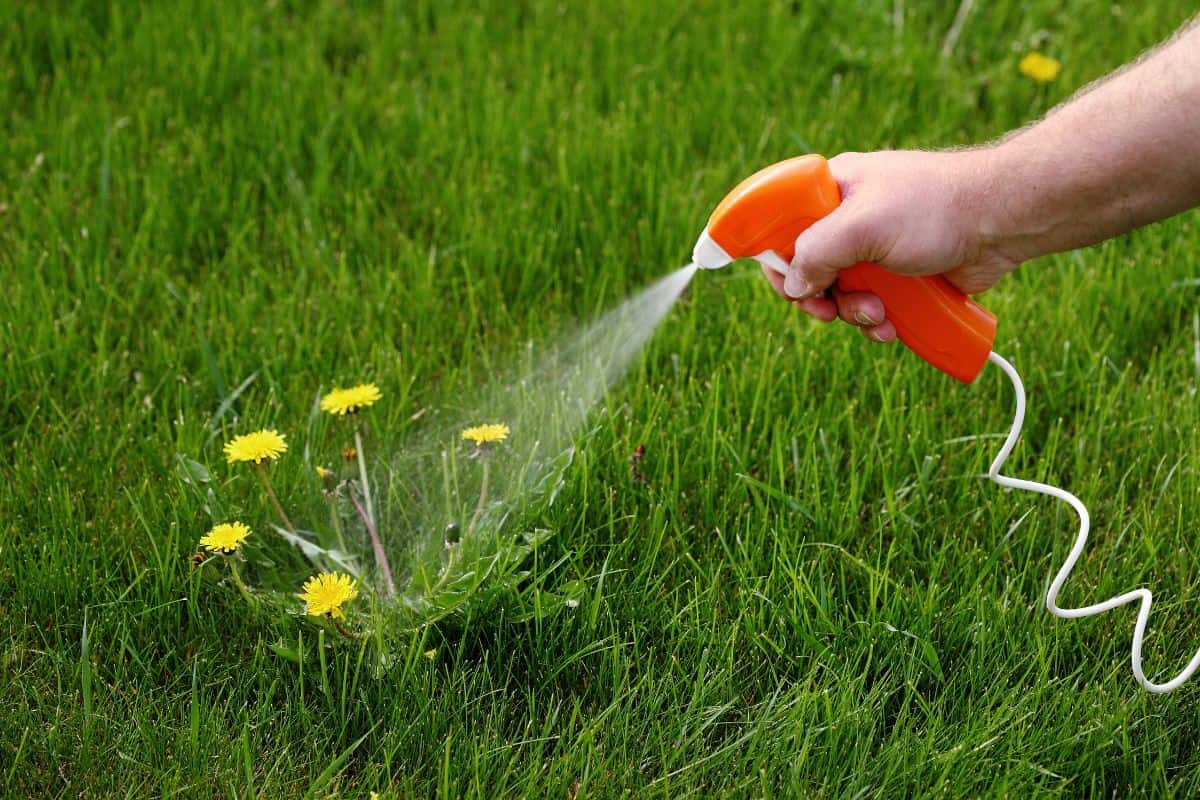
Although Roundup won't work "better" in hotter weather, waiting for a warmer, clear day can be beneficial. As we said, using Roundup in temperatures between 45 and 90 degrees is best.
So, as long the weather doesn't exceed 90 degrees Fahrenheit, your product should have a good success rate. That said, if you use Roundup in extreme heat or arid conditions, this is when issues can occur.
Remember, air and ground conditions play a significant role in herbicide effectiveness. So, high temperatures above 90 degrees mixed with dry conditions can become a problem for your herbicide.
According to Bayer, spraying Roundup/weed killers in extreme heat can hinder their final results.
Specifically, anything above the low 90s can cause an issue with your herbicide's "uptake," meaning the active ingredients may take longer or fail to start working.
If the weather surpasses 90 degrees, this is when we recommend waiting a few days until the heat wave is over. The less heat, the better for Roundup!
What Is The Best Time Of Day To Spray Roundup?
Now that you know what weather to avoid using Roundup, what time of day is best for its ingredients? In general, you want to either apply Roundup to weeds in the mid-afternoon or into the later evening.
The main reasoning behind this is that you will have a better idea of the day's climate by mid-afternoon. In contrast, spraying first thing in the morning can be risky, especially if an afternoon rain shower or high winds come into play.
On top of that, Roundup tends to absorb better during the later afternoon and evening. So, if you want your product to work quickly and effectively, we recommend avoiding early morning sprays.
According to Top Crop Manager, it was also proven in various studies that spraying herbicides closer to midnight proved more effective than in the morning. So, if you're a late-night gardener, we have good news.
How Soon Can I Turn On Sprinklers After Using Roundup?
If you recently applied Roundup to your garden, we recommend waiting 24 hours before watering or turning on the sprinklers. As we said before, your product may rainproof in 30-180 minutes, but it's usually best to wait even longer before adding water.
According to many experts, you want to let your herbicide seep into your weeds from all angles. Since this takes time, turning on the sprinklers right away can deem your products ineffective.
Like rain, your sprinklers will wash off the Roundup from your weeds, potentially moving the chemicals into healthy, non-weeded sections of your landscape.
This can be especially crucial for weeds located in your grass. Typically, the longer you wait to water your lawn, the better Roundup can activate and kill unwanted plants.
And, of course, if all else fails, read the instructions with your Roundup and see what they recommend for watering timelines and aftercare.
How Long Does It Take For Roundup To Work?
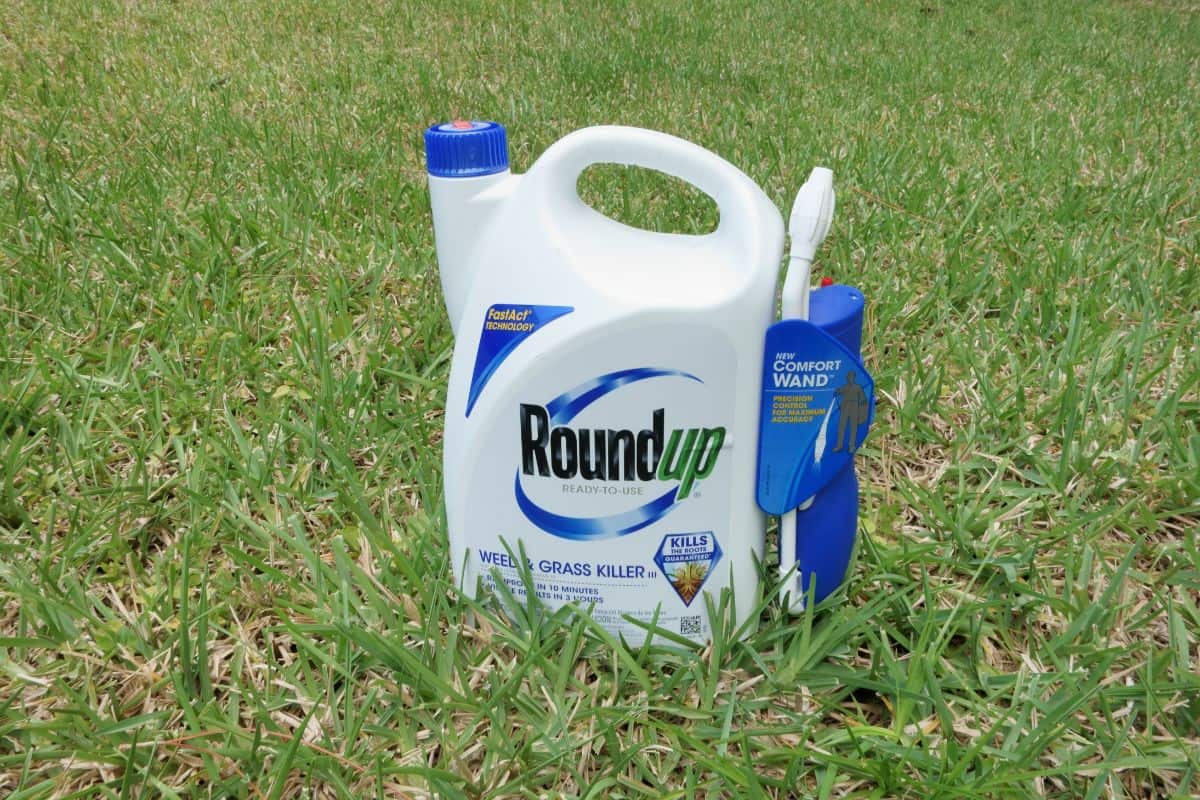
Since the main ingredient in Roundup products is glyphosate, you should start to see results after a few days. However, Roundup offers various product timelines, which can be as short as same-day results.
Specifically, it's common to begin noticing changes in your weeds within four hours with heavy-duty Roundup weed killers.
Furthermore, some of their lawn formulas take a couple of days to work, but they're still incredibly effective. According to the brand, their 'Roundup® Weed & Grass Killer' will show results in as little as three hours, while the 'Roundup® Max Control 365' takes closer to 12.
To Wrap It All Up
Whether you have pesky weeds or haven't tried using herbicide before, it's always good to understand how its formula works. We found that Roundup can waterproof itself within 30-180 minutes, although this varies by product.
Therefore, if it rains within that grace period, you could need to reapply your chemical once things clear up. Ideally, you should wait to use Roundup until the skies are clear and there isn't much wind.
Made it to the end? Check out these helpful related garden articles below!
How To Use A Roundup Sprayer [And Troubleshooting If Not Working]
How To Clean Up Roundup Spill On Concrete
Does Roundup Kill Shrubs And Trees?
